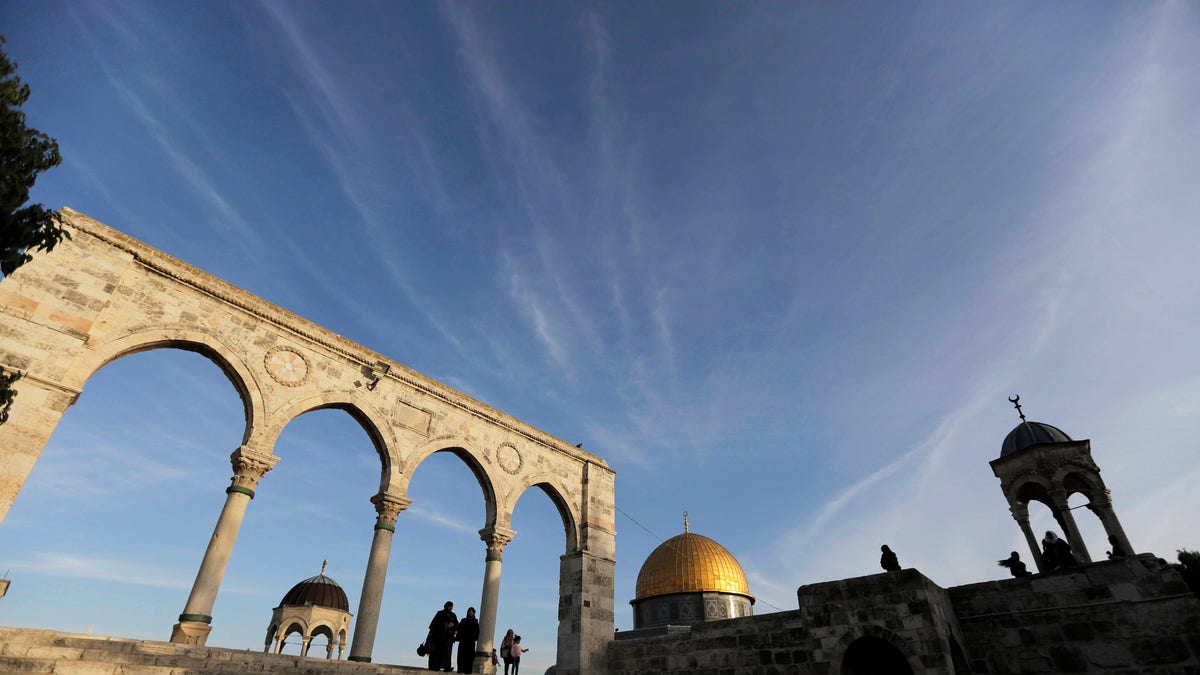
The Dome of the Rock (C) is seen in the background, as Palestinians visit the compound known to Muslims as Noble Sanctuary and to Jews as Temple Mount, in Jerusalem's Old City January 21, 2014. REUTERS/Ammar Awad (JERUSALEM - Tags: SOCIETY RELIGION TRAVEL TPX IMAGES OF THE DAY) - RTX17OCA
LOS ANGELES – The secret to success in making a big Hollywood movie is increasingly to go east, young man. Or more precisely, go Middle East. In spite of the tensions that have inflamed the region for centuries, Hollywood has hardly hesitated to take big productions abroad in recent years:
• “Star Wars Episode VII: The Force Awakens,” “Fast & Furious 7” and “Deliver Us from Evil” were filmed in Abu Dhabi, United Arab Emirates.
• “Exodus: Gods and Kings,” “Prometheus,” “Transformers: Revenge of the Fallen” “The Hurt Locker” and “Zero Dark Thirty” saw considerable filming in Jordan.
• “Fair Game” was filmed in Egypt.
• “Murder in Mesopotamia” and “In Desert and Wilderness” were brought to life in Tunisia.
The reason for this is simple: Despite years of conflict, the Middle East offers attractive packages and tax incentives that Hollywood can’t ignore.
In addition to offering a wealth of locations that range from a dazzling coastline under year-round sunny skies to its primitive desert and cities with classical architecture, the United Arab Emirates features a generous 30 percent rebate on production costs and assistance in organizing permits, visas, customs clearance and script approval – which is compulsory ahead of all movie and TV series shoots. The UAW also provides free help with location scouting.
According to the Hollywood Reporter, the Royal Film Commission Jordan has made approvals that will see some projects receive exemptions from custom taxes and the Value Added Tax (VAT) – a 16 percent value added tax to products and services purchased.
Tunisia provides supportive local authorities, a friendly business environment and reimbursements for VAT. In Morocco, where labor costs are extremely low, foreign producers can obtain shooting permits in less than no time and don’t pay VAT. In Egypt, all project imports (except for passenger cars brought in for filming) are exempt from capital, sales and other taxes, plus custom duties and tariffs for the project’s duration. Neither the projects nor their profits are subject to Egypt’s tax laws throughout the filming duration and project exports will not be subject to standard customs procedures.
In 2008, Israeli officials tired of seeing movies set in “Jerusalem” being made in Malta, Morocco and Greece. So they started offering better tax breaks, terror attack insurance and credits of up to $400,000 to cajole international movie producers to the nation.
And now Turkey wants in on the act. According to Middle East news site Al-Monitor, the Turkish Culture and Tourism Ministry has drafted a bill that would allow it to meet 25 percent of production costs for foreign filmmakers who shoot in the country. The expectation is that celebrity names and high-quality productions will give Turkey’s flagging cinema market a needed helping hand.
Right now, joint productions between Turkish and European Union filmmakers qualify for financial assistance only if the Turkish partner holds more than half the share in the venture, meaning the film can be considered “Turkish.” The new bill will remove that stipulation, paving the way for European and American filmmakers to get financial help — providing the film is shot in Turkey.
It’s all a win-win for the foreign filmmakers and the Mideast countries, says Samer M. Ali, associate professor of Arabic and Islamic studies and comparative literature at the University of Texas.
“The primary reason Middle East countries want Hollywood productions are economic, and the secondary reason is publicity and opportunity to showcase the beauty of the locale,” he told FOX411 via e-mail.
“The publicity is important – most Middle East countries are terribly misunderstood in the U.S. They crave the chance to brand themselves as destinations for tourism and business prospects.”
Ali also noted that the low cost or labor and everyday commodities in the region are also an enticing element for foreign entities.
But taking Hollywood productions into the Middle East isn’t always a piece of baklava.
“For example, it is almost impossible to secure film insurance in Egypt because of the ongoing unrest,” said Margaret Cone, a Washington-based attorney who has worked extensively in the Middle East.
The Jewish Journal reported in 2011 that Israel’s package was not as successful as desired, because Jerusalem is still considered too volatile to ensure problem-free filming, and insurance companies have either refused to provide coverage or offered it at extremely high prices.
Ali says there is a perception of security risk, but people are far more likely to suffer some form of harm in the U.S. than be victims of a terrorist attack in the Middle East.
“The rate of crime is generally very low in almost every Middle East country,” he said.
Cone anticipates the region will become even more of a Hollywood draw in the years ahead.
“Middle East countries desire Hollywood productions, as it diversifies their economies, creates jobs for young people and it encourages tourism,” she said. “It is strictly a business decision — if these countries continue to provide the most attractive tax incentives, discounts and financing."






